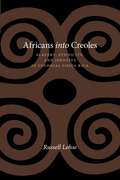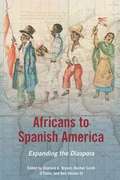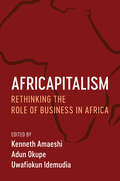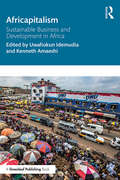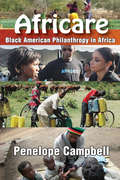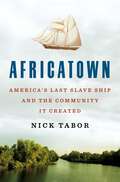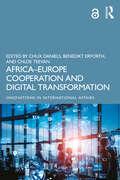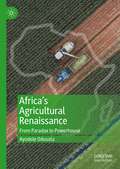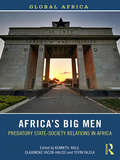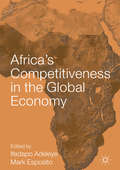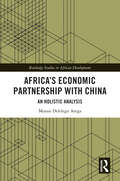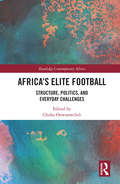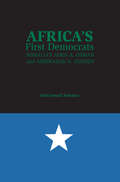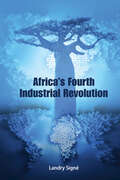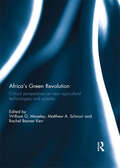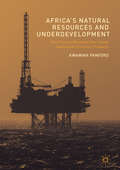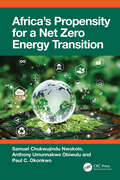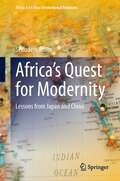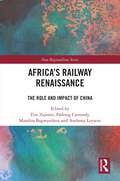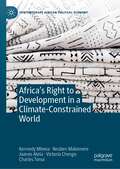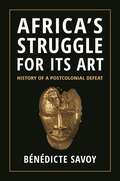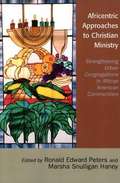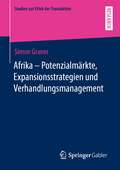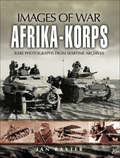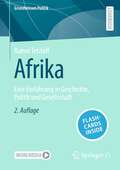- Table View
- List View
Africans into Creoles: Slavery, Ethnicity, and Identity in Colonial Costa Rica (Diálogos Series)
by Russell LohseUnlike most books on slavery in the Americas, this social history of Africans and their enslaved descendants in colonial Costa Rica recounts the journey of specific people from West Africa to the New World. Tracing the experiences of Africans on two Danish slave ships that arrived in Costa Rica in 1710, the Christianus Quintus and Fredericus Quartus, the author examines slavery in Costa Rica from 1600 to 1750. Lohse looks at the ethnic origins of the Africans and narrates their capture and transport to the coast, their embarkation and passage, and finally their acculturation to slavery and their lives as slaves in Costa Rica. Following the experiences of girls and boys, women and men, he shows how the conditions of slavery in a unique local setting determined the constraints that slaves faced and how they responded to their condition.
Africans to Spanish America: Expanding the Diaspora
by Sherwin K. Bryant Rachel Sarah O'Toole Ben VinsonAfricans to Spanish America expands the diaspora framework to include Mexico, Peru, Ecuador, and Cuba, exploring the connections and disjunctures between colonial Latin America and the African diaspora in the Spanish empires. Analysis of the regions of Mexico and the Andes opens up new questions of community formation that incorporated Spanish legal strategies in secular and ecclesiastical institutions as well as articulations of multiple African identities. The volume is arranged around three sub-themes: identity construction in the Americas; the struggle by enslaved and free people to present themselves as civilized, Christian, and resistant to slavery; and issues of cultural exclusion and inclusion. Contributors are Joan Cameron Bristol, Nancy E. van Deusen, Leo Garafalo, Herbert S. Klein, Charles Beatty Medina, Karen Y. Morrison, Rachel Sarah O'Toole, Frank "Trey" Proctor, and Michele B. Reid.
Africapitalism: Rethinking The Role Of Business In Africa
by Kenneth Amaeshi Adun Okupe Uwafiokun IdemudiaAfrica is on the rise. Enabled by natural resources, commodity trading and the recent discovery of Africa as the last frontier of capitalism by the global market, African entrepreneurs are now being empowered as economic change agents. How can this new economic elite engage in the sustainable development of the continent? 'Africapitalism', the term coined by Nigerian economist Tony O. Elumelu, describes an economic philosophy embodying the private sector's commitment to the economic transformation of Africa through investments generating economic prosperity and social wealth. The concept has attracted significant attention in both business and policy circles. Promoting a positive change in approach and outlook towards development in Africa, this book consolidates research and insights into the Africapitalism movement, and will appeal to scholars, researchers and graduate students of Africa studies, international business, business and society, corporate social responsibility, strategic management, economic thought, international political economy, leadership and development studies.
Africapitalism: Sustainable Business and Development in Africa
by Kenneth Amaeshi Uwafiokun IdemudiaUsing theory, empirical research, and case studies, this book explores the changing nature of business in Africa and how businesses can actively contribute to the development of Africa. It uses (and critically analyses) the concept of Africapitalism – a management philosophy and movement which seeks to blend the best of African values and Western management theories as a basis for sustainable development in Africa – to understand the subtle factors that underpin business decisions in Africa. The collection of chapters in this book are organized around actors, issues, and reflections. They collectively present an account of Africapitalism, albeit from different perspectives and on different issues, and open up a new space for rethinking business and society relations in Africa from an Africapitalism perspective. Crucial is the critical engagement with both the discourse and practice of Africapitalism and its implications for sustainable development. It is anticipated that the challenges and opportunities highlighted by the book would be embraced by researchers, policy makers, and practitioners in the broad area of business and society in Africa. This multidisciplinary book will be valuable reading for advanced students, researchers and policymakers looking at business in society; corporate social responsibility; sustainable business; international business and African development.
Africare: Black American Philanthropy in Africa
by Penelope CampbellAfricare is a US-based non-profit organization specializing in development aid for Africa. It is also the oldest and largest African-American led organization in the development field. Since its founding in 1970, Africare has delivered more than $710 million in assistance through over 2,500 projects to thirty-six African countries. The organization employs over 1,000 people, largely indigenous to the countries affected.This is a study in leadership and competing African and American black interests. Africare has sought to become the leading voice speaking on Africa within the US, a goal more difficult to attain than becoming the premier NGO in Africa. Sources of opinion and channels of expression about American policy in Africa are fragmented. They do not have name recognition or influential sponsors. There is poor coverage of African affairs in the US, except for key, often tragic, events. Africare has a heritage and has filled a niche in American society. Penelope Campbell argues that unless the organization reclaims these unique assets, it may lose the distinctiveness enabling its survival.The challenge for Africare is spreading its story and message. The author raises disturbing fundamental issues. Has foreign aid become such an industry that the patient is not allowed to get well? As the military cannot afford peace, it seems the world cannot afford the cessation of poverty. Campbell argues that success in Africa has been elusive not because of the failures of development organizations, but the magnitude of the issues involved. The author presents a convincing case for aid to Africa, the pitfalls involved, and for Africare's potential as a leader in meeting the continent's needs.
Africatown: America's Last Slave Ship and the Community It Created
by Nick TaborAn evocative and epic story, Nick Tabor's Africatown charts the fraught history of America from those who were brought here as slaves but nevertheless established a home for themselves and their descendants, a community which often thrived despite persistent racism and environmental pollution.In 1860, a ship called the Clotilda was smuggled through the Alabama Gulf Coast, carrying the last group of enslaved people ever brought to the U.S. from West Africa. Five years later, the shipmates were emancipated, but they had no way of getting back home. Instead they created their own community outside the city of Mobile, where they spoke Yoruba and appointed their own leaders, a story chronicled in Zora Neale Hurston’s Barracoon. That community, Africatown, has endured to the present day, and many of the community residents are the shipmates’ direct descendants. After many decades of neglect and a Jim Crow legal system that targeted the area for industrialization, the community is struggling to survive. Many community members believe the pollution from the heavy industry surrounding their homes has caused a cancer epidemic among residents, and companies are eyeing even more land for development. At the same time, after the discovery of the remains of the Clotilda in the riverbed nearby, a renewed effort is underway to create a living memorial to the community and the lives of the slaves who founded it.
Africa–Europe Cooperation and Digital Transformation (Innovations in International Affairs)
by Chux Daniels, Benedikt Erforth and Chloe TeevanAfrica–Europe Cooperation and Digital Transformation explores the opportunities and challenges for cooperation between Africa and Europe in the digital sphere. Digitalisation and digital technologies are not only essential for building competitive and dynamic economies; they transform societies, pose immense challenges for policymakers, and increasingly play a pivotal role in global power relations. Digital transformations have had catalytic effects on African and European governance, economies, and societies, and will continue to do so. The COVID-19 pandemic has already accelerated the penetration of digital tools all over the globe and is likely to be perceived as a critical juncture in how and to what purpose the world accepts and uses new and emerging technologies. This book offers a holistic analysis of how Africa and Europe can manage and harness digital transformation as partners in a globalised world. The authors shed light on issues ranging from economic growth, youth employment, and gender, to regulatory frameworks, business environments, entrepreneurship, and interest-driven power politics. They add much-needed perspectives to the debates that shape the two continents’ digital transformation and innovation environments. This book will interest practitioners working in the areas of innovation, digital technologies, and digital entrepreneurship, as well as students and scholars of international relations. It will also be relevant for policymakers, regulators, decision-makers, and leaders in Africa and Europe.
Africa’s Agricultural Renaissance
by Ayodele OdusolaThis book addresses the paradox between preponderance of hunger in a continent that is well endowed with fertile agricultural land, plenty of fresh water and a vibrant labor force. As some statistics show, close to 60% of arable land in the world is located in Africa which also has several rivers flowing in all seasons and plenty of underground water. The bulk of its labor force thrives on agriculture, yet the continent’s largest import item is food. 23 of 36 the most malnourished countries also belong in Africa. This has caused significant needless human suffering. <P><P> This book goes beyond providing the traditional framework of supplying policy recommendations to delivering an applied, innovative framework upon which policymakers, the private sector and international institutions can take clear and deliberate action to stimulate Africa's agricultural sector, thus responding to the 2030 Agenda for Sustainable Development.
Africa’s Big Men: Predatory State-Society Relations in Africa (Global Africa)
by Toyin Falola Kenneth Kalu Olajumoke Yacob-HalisoThis book spotlights, analyzes and explains varying forms and patterns of state-society relations on the African continent, taking as point of departure the complexities created by the emergence, proliferation and complicated interactions of so-called ‘big men’ across Africa's fifty-four states. The contributors interrogate the evolution of Africa’s big men; the role of the big men in Africa’s political and economic development; and the relationship between the state, the big men and the citizens. Throughout the chapters the contributors engage with a number of questions from?different disciplinary and methodological orientations. How did these states evolve to exhibit various deformities in their composition, functioning and in their relations with the societies that they govern? What roles did Atlantic and other slavery and European colonialism play in creating states that are unable to display the right and good relationships with citizens in civil society? Why did these forms of predatory state-society relations continue to thrive in Africa after the end of Atlantic slave trade and subsequent colonialism? Why did the emerging African leaders at independence fail to effectively dismantle the structures of exploitation and expropriation that were the defining features of slavery and colonialism? Who are Africa’s ‘big men’, and what are their trajectories? This book is essential reading for all students and scholars of African politics, public policy and administration, political economy, and democratisation.
Africa’s Competitiveness in the Global Economy (Aib Sub-saharan Africa (ssa) Ser.)
by Ifedapo Adeleye Mark EspositoThis book highlights the key issues, opportunities and challenges facing African firms, industries, cities and nations in their quest to compete successfully in the global economy. Exploring a topic which has grown in importance as Africa faces a period of subdued economic development, this edited collection takes a unique multi-disciplinary, multi-industry and multi-country approach. The authors provide insights into a broad range of issues, including competitiveness measurement and evaluation, sectoral competitiveness of declining and emerging industries, threats of the 'Dutch Disease,' and talent competitiveness. This timely book offers a response to the urgent need for the diversification of economies and the advancement of manufacturing in Africa, appealing to scholars of international business and economics.
Africa’s Economic Partnership with China: An Holistic Analysis (Routledge Studies in African Development)
by Mussie Delelegn AregaThis book examines how increasing Africa-China relations in the fields of trade, development finance and investment have impacted productive capacities and structural economic transformation in sub-Saharan Africa (SSA). The book argues that statistical and empirical evidence shows that China’s influence has not substantially altered the fundamentals in Africa, and instead outlines a framework of policy conclusions and recommendations to help achieve transformational growth and development. Despite increased Chinese investments in transport, energy, communications, and manufacturing, sub-Saharan Africa is yet to see tangible economic and development benefits according to the multidimensional Productive Capacities Index (PCI). External trade is dogged by the same problems as during the colonial era, with primary commodities dominating exports to China, and industrial or manufacturing products dominating imports, thereby leaving the region exposed to external economic shocks. The book considers whether there are lessons to be learned from the experience of Asian countries such as Vietnam, proposing pragmatic, coordinated, non-ideological, and non-confrontational policy approaches to development. This book will be of interest to researchers, policymakers, advisors, academics, and practitioners with an interest in development in Africa, and China’s increasing role in the continent.
Africa’s Elite Football: Structure, Politics, and Everyday Challenges (Routledge Contemporary Africa)
by Chuka OnwumechiliThis book explores various aspects of intranational elite football in Africa, drawing on the expertise of notable scholars from across the world. Africa’s Elite Football focuses on an area largely ignored by current scholarship on African football, where interest has focused on international migration. In exploring the intranational, the book is written in two parts. The first is a general focus on the continent, and the second is an examination of country cases. The general focus of the book is on the nature of elite tier leagues, the relationship between politics and football, the media, youth academies, intranational migration and fans. Notably, chapters on topics such as intranational migration present groundbreaking scholarship in this area. Currently, football discourses on migration focus on international migration of footballers, yet the majority of migration in African football is intranational. Thus, by addressing the intranational, this book brings attention to an area that is underrepresented in the current academic discourse. The second part of the book, which focuses on country cases, covers Botswana, Egypt, Kenya, Nigeria, Senegal, Zambia and Zimbabwe. The topics explored in those cases include religiosity, health, women’s football, media and management. The coverage of health-related issues is particularly important given that several books on African football rarely broach such a topic. With its unique approach to African football, this book will be of interest to scholars and students of sports history, African studies, politics in sports and African sports.
Africa’s First Democrats: Somalia’s Aden A. Osman and Abdirazak H. Hussen
by Abdi Ismail SamatarAbdi Ismail Samatar provides a clear and foundational history of Somalia at the dawn of the country's independence when Africa's first democrats appeared. While many African countries were dominated by authoritarian rulers when they entered the postcolonial era--and scholars have assumed this as a standard feature of political leadership on the continent--Somalia had an authentic democratic leadership. Samatar's political biography of Aden A. Osman and Abdirazak H. Hussen breaks the stereotype of brutal African tyranny. Samatar discusses the framing of democracy in Somalia following the years of control by fascist Italy, the formation of democratic organizations during the political struggle, and the establishment of democratic foundations in the new nation. Even though this early state of affairs did not last, these leaders left behind a strong democratic legacy that may provide a model of good governance for the rest of the continent.
Africa’s Green Revolution: Critical Perspectives on New Agricultural Technologies and Systems
by William G. Moseley, Matthew A. Schnurr and Rachel Bezner KerrThis volume examines the dominant neoliberal agenda for agricultural development and hunger alleviation in Africa. The text reviews the history of African agricultural and food security policy in the post-colonial period, across a range of geographical contexts, in order to contextualise the productionist approach embedded in the much heralded New Green Revolution for Africa. This strategy, supported by a range of international agencies, promotes the use of hybrid seeds, fertilisers, and pesticides to boost crop production. This approach is underpinned by a new and unprecedented level of public–private partnerships as donors actively work to promote the private sector and build links between African farmers, input suppliers, agro-dealers, agro-processors, and retailers. On the consumer end, increased supermarket penetration into poorer neighbourhoods is proffered as a solution to urban food insecurity. The chapters in this volume complicate understandings of this new approach and raise serious questions about its effectiveness as a strategy for increasing food production and alleviating poverty across the continent.This book is based on a special issue of African Geographical Review.
Africa’s Natural Resources and Underdevelopment: How Ghana’s Petroleum Can Create Sustainable Economic Prosperity
by Kwamina PanfordThis book explores how African countries can convert their natural resources, particularly oil and gas, into sustainable development assets. Using Ghana, one of the continent's newest oil-producing countries, as a lens, it examines the "resource curse" faced by other producers - such as Nigeria, Angola, and Equatorial Guinea - and demonstrates how mismanagement in those countries can provide valuable lessons for new oil producers in Africa and elsewhere. Relying on a broad range of fieldwork and policymaking experience, Panford suggests practical measures for resource-rich developing countries to transform natural resources into valuable assets that can help create jobs, boost human resources, and improve living and working conditions in Ghana in particular. He suggests fiscal, legal, and environmental antidotes to resource mismanagement, which he identifies as the major obstacle to socioeconomic development in countries that have historically relied on natural resources.
Africa’s Propensity for a Net Zero Energy Transition
by Samuel Chukwujindu Nwokolo Anthony Umunnakwe Obiwulu Paul C. OkonkwoThis book explores the issue of a sustainable energy transition in Africa, including the current energy landscape and exploration of various scenarios for achieving net zero emissions. It highlights the challenges faced by African countries in transitioning to clean energy and provides practical solutions for these challenges. It provides perceptive analysis and case studies demonstrating how African nations can take advantage of their natural resources, including insights from Bhutan and Denmark to achieve sustainable development while mitigating the effects of climate change.Features: Offers unique insights into the specific challenges and opportunities that Africa faces in achieving a net zero energy future. Provides comprehensive understanding of the region's renewable energy potential, including analysis of policies and initiatives driving sustainable development. Highlights successful case studies, emerging technologies, and the economic and environmental benefits of transitioning to net zero energy. Explores the role of international collaborations and partnerships in supporting Africa's journey toward a net zero energy future. Discusses solutions that must be tailored to the specific needs and contexts of African countries. This book is aimed at graduate students and researchers in the field of sustainability and energy systems.
Africa’s Quest for Modernity: Lessons from Japan and China (Africa-East Asia International Relations)
by Seifudein AdemThis monograph addresses the complexity of China-Africa and Japan-Africa relations from a comparative perspective. The volume is divided into five sections. Section I focuses on the divergent perspectives that are reflected in the discourse on China-Africa relations. Section II discusses Japan’s economic modernization and its potential lessons for Africa. Section III compares the foreign policies of Japan and China in Africa and analyzes their supposed rivalries on the continent. Section IV explores the relationship between Southeast Asia and China and its relevance to Africa-China relations. Section V provides an in-depth case study of Ethiopia-China relations over the last century. The book fills a major gap in the existing literature on the triad of Africa, China, and Japan. Under the guidance of the disciplines of African studies, international relations, political sociology, and international political economy, this volume elucidates and examines the complexities of the foreign policies of the two Asian powers toward Africa as well as their economic, political, and cultural underpinnings.
Africa’s Railway Renaissance: The Role and Impact of China (New Regionalisms Series)
by Tim ZajontzThis book investigates the history, political economy and spatiality of Chinese railway projects in Africa. It examines the financial governance of Sino-African railway projects, their socio-cultural, political and economic effects as well as the regional dimension of Africa’s new railway architecture and its function within China’s Belt and Road Initiative. Leading and emerging scholars from Africa, China, Europe and the Americas offer interpretations through politico-economic, historical, geographical and post-colonial conceptual lenses. Case studies on projects in Angola, Ethiopia, Kenya, Nigeria, Tanzania and Zambia offer an empirically rich and cross-disciplinary picture of Sino-African railway developments at the micro-, meso- and macro-levels. Regional analyses on West and East Africa expose persistent obstacles to the regional integration of Africa’s railways. The volume outlines opportunities and challenges related to Africa’s railway renaissance in the post-Covid-19 global political economy and will be of great interest to academics, students and practitioners interested in Africa-China relations and their developmental effects or in the politics of infrastructure, spatial governance and the political economy of transport.
Africa’s Right to Development in a Climate-Constrained World (Contemporary African Political Economy)
by Kennedy Mbeva Reuben Makomere Joanes Atela Victoria Chengo Charles TonuiThis book examines how Africa can secure a ‘just transition’ to low-carbon, climate-resilient economies.
Africa’s Struggle for Its Art: History of a Postcolonial Defeat
by Bénédicte SavoyA major new history of how African nations, starting in the 1960s, sought to reclaim the art looted by Western colonial powers For decades, African nations have fought for the return of countless works of art stolen during the colonial era and placed in Western museums. In Africa’s Struggle for Its Art, Bénédicte Savoy brings to light this largely unknown but deeply important history. One of the world’s foremost experts on restitution and cultural heritage, Savoy investigates extensive, previously unpublished sources to reveal that the roots of the struggle extend much further back than prominent recent debates indicate, and that these efforts were covered up by myriad opponents.Shortly after 1960, when eighteen former colonies in Africa gained independence, a movement to pursue repatriation was spearheaded by African intellectual and political classes. Savoy looks at pivotal events, including the watershed speech delivered at the UN General Assembly by Zaire’s president, Mobutu Sese Seko, which started the debate regarding restitution of colonial-era assets and resulted in the first UN resolution on the subject. She examines how German museums tried to withhold information about their inventory and how the British Parliament failed to pass a proposed amendment to the British Museum Act, which protected the country's collections. Savoy concludes in the mid-1980s, when African nations enacted the first laws focusing on the protection of their cultural heritage.Making the case for why restitution is essential to any future relationship between African countries and the West, Africa’s Struggle for Its Art will shape conversations around these crucial issues for years to come.
Africentric Approaches to Christian Ministry: Strengthening Urban Congregations in African American Communities
by Rosetta E. Ross J. Deotis Roberts Katie Geneva Cannon Warren L. Dennis Gayraud Wilmore Gloria J. Tate Marsha Snulligan Haney Ronald Edward Peters Richard C. Chapple Tumani Mutasa Nyajeka Johnnie Monroe Cain Hope Fielder Fred Douglas SmithIn a pluralistic world where the tendency is to dismiss or silence ethnic and racial differences, Africentric Approaches to Christian Ministry: Strengthening Urban Congregations in African American Communities offers invaluable insight into the ordering of urban congregational life, Christian ministry, and urban missiology from a worldview perspective that values the centrality of African people. Theological leaders and framers of African American religious studies, such as the following persons provide provocative insight for theological reflection and praxis: Gayraud Wilmore (The Black Church); J. Deotis Roberts (Africentric Christianity); Katie Geneva Cannon (Diaspora Ethics); and Cain Hope Fielder (New Testament Studies). The opening and closing chapters by co-editors Ronald Edward Peters and Marsha Snulligan Haney provide a critical knowledge base that frames Africentric Approaches to Christian Ministry. In light of the rapidly changing nature of Christianity globally (non-Western and non-European), this is a significant study on African American religious consciousness and urban praxis.
Afrika - Potenzialmärkte, Expansionsstrategien und Verhandlungsmanagement (Studien zur Ethik der Transaktion)
by Simon GranerDiese Dissertation befasst sich mit dem Thema einer Expansion nach Afrika und beleuchtet alle polydimensionalen Transaktionen, die hinsichtlich der Auswahl möglicher afrikanischer Potenzialmärkte, adäquater Expansionsstrategien und lokalem Verhandlungsmanagement notwendig sind.Die Forschungsfragen, die diesbezüglich beantwortet werden, sind: Welches sind die afrikanischen Länder, mit denen es sich aktuell und in Zukunft lohnt Geschäfte zu machen? Mit welchen Strategien kann ein expansionswilliges Unternehmen aus Deutschland oder Europa auf den afrikanischen Kontinent expandieren und in Afrika weiter wachsen? Wie sollen Geschäfte in den Expansionsländern eingefädelt und abgewickelt werden, um nachhaltigen Geschäftserfolg in Afrika zu erzielen? Welche kulturellen und ethischen Aspekte sind notwendig?Durch praktische Werkzeuge, die die theoretischen Ausarbeitungen abrunden, verliert diese Dissertation nie an Aktualität und kann auch in Zukunft branchen- und unternehmensindividuell genutzt werden.
Afrika-Korps: Rare Photographs from Wartime Archives (Images of War)
by Ian BaxterA pictorial history of the Nazi German army expeditionary force deployed to North Africa during World War II between 1941 and 1943.Afrika-Korps is an illustrated record of Field-Marshal Erwin Rommel and his desert troops that fought in North Africa against British and Commonwealth forces between 1941 and 1943. Using previously rare and unpublished photographs, many of which have come from the albums of individuals who took part in the desert campaign, it presents a unique visual account of the famous Afrika-Korps operations and equipment. Thanks to an informative caption with every photograph Afrika Korps vividly portrays how the German Army fought across the uncharted and forbidding desert wilderness of North Africa. Throughout the book it examines how Rommel and his Afrika Korps were so successful and includes an analysis of desert war tactics which Rommel himself had indoctrinated. These tactics quickly won the Afrika-Korps a string of victories between 1941 and 1942. The photographs that accompany the book are a fascinating collection that depicts life in the Afrika-Korps, as seen through the lens of the ordinary soldier.
Afrika: Eine Einführung in Geschichte, Politik und Gesellschaft (Grundwissen Politik)
by Rainer TetzlaffDas Lehrbuch bietet auch in der 2. erweiterten und aktualisierten Auflage einen vertieften Überblick über Geschichte und Politik Afrikas, vom Sklavenhandel, über die Phasen von Kolonialismus und Dekolonisation bis zu den Entwicklungsproblemen der Gegenwart. Dabei werden diverse Entwicklungstheorien zur Erklärung von erfolgreichen und fehlgeschlagenen Entwicklungspfaden einzelner Länder nach 1960 herangezogen. Thematische Schwerpunkte sind Europas koloniales Erbe, Staatsbildung und Staatszerfall, Demokratisierung, Rohstoffpolitik, Bevölkerungswachstum, Hunger und Armut, Kriege und ethnische Konflikte sowie Weltbank, EU, China und Russland als externe Akteure in Afrika.Zusätzliche Fragen per App: Laden Sie die Springer Nature Flashcards-App kostenlos herunter, um Ihr Wissen zu prüfen.
